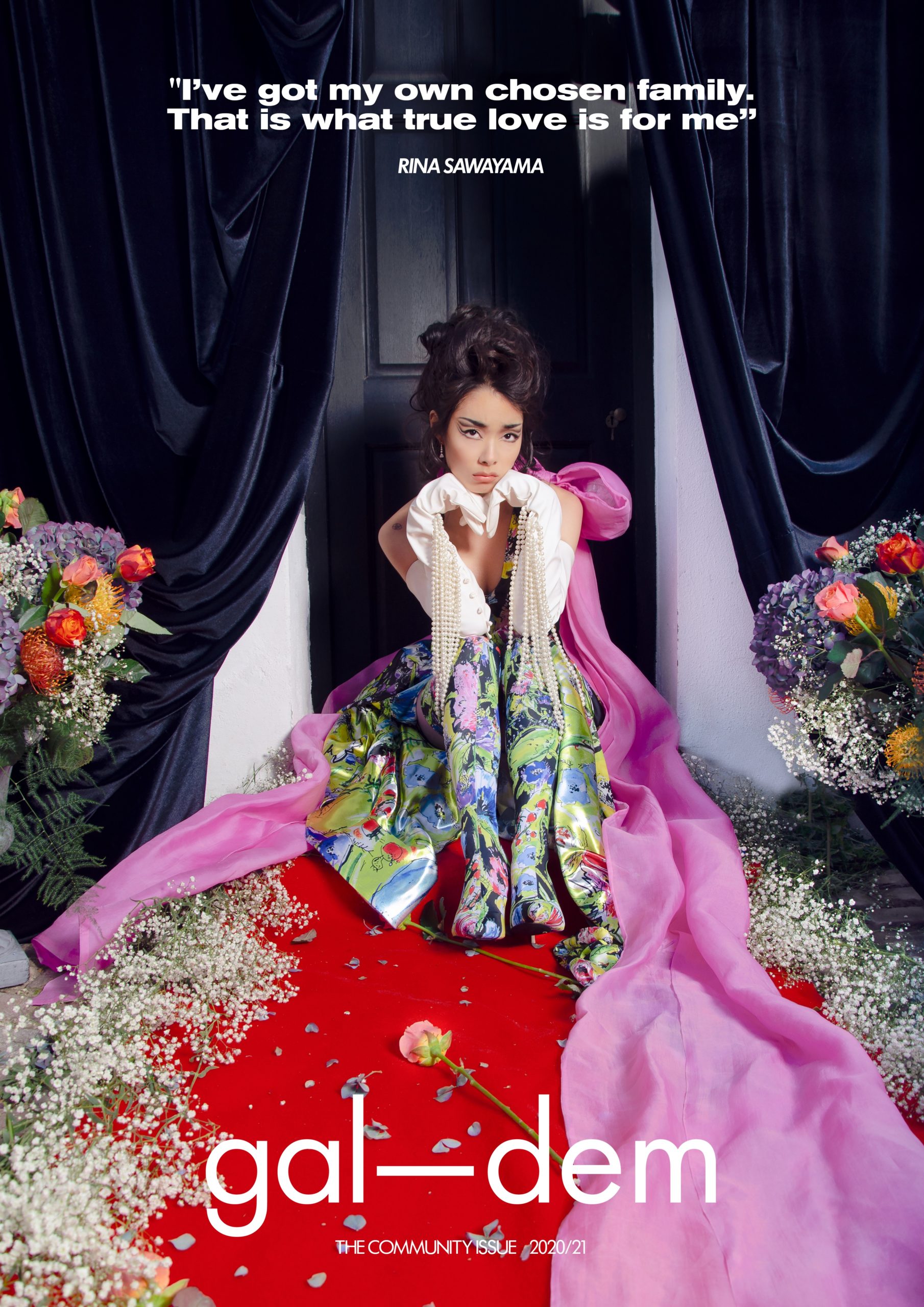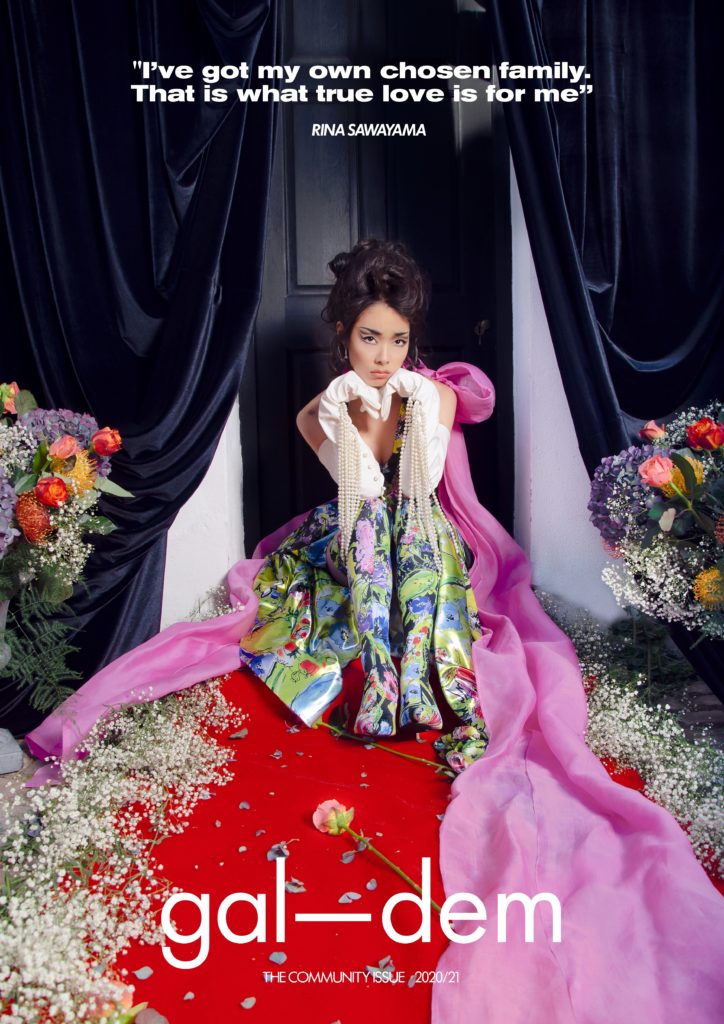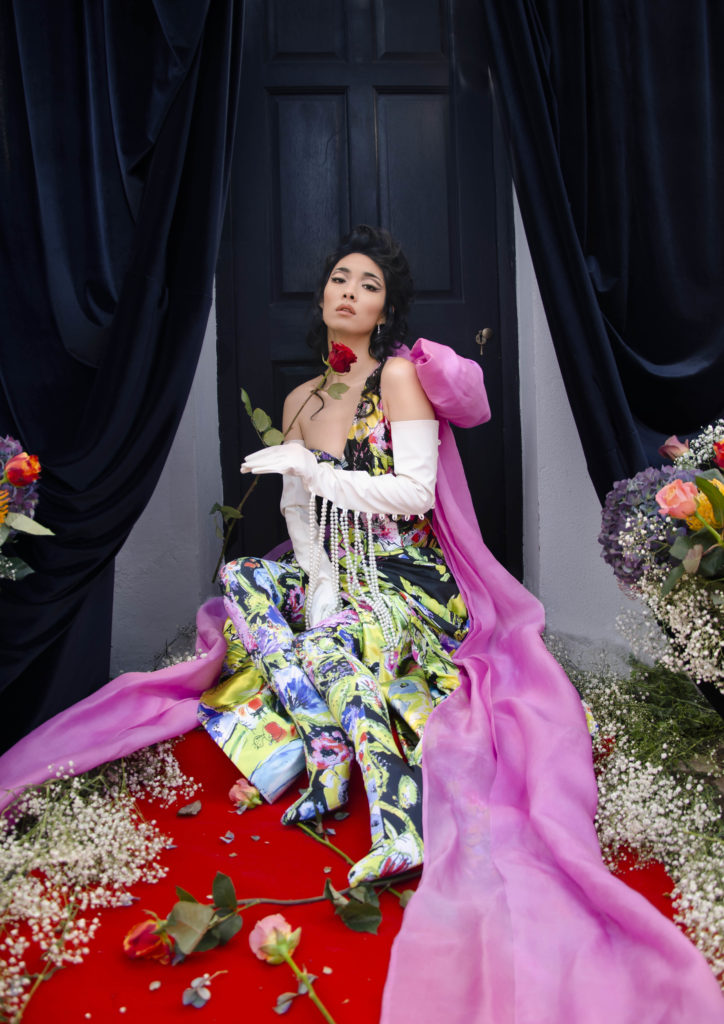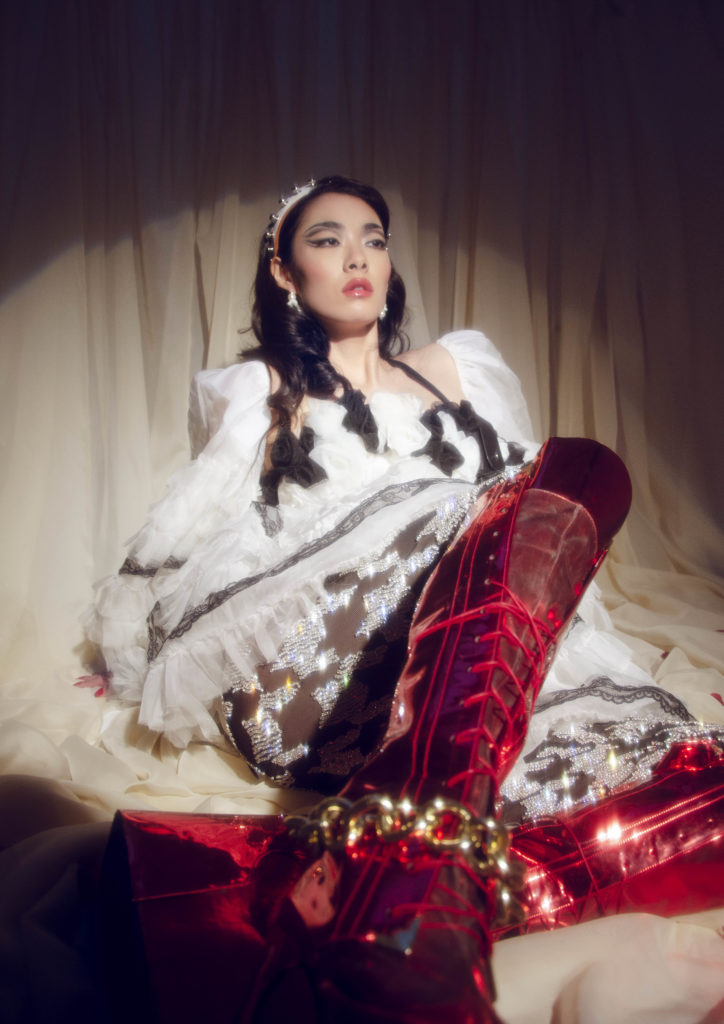‘I’ve found true love in my chosen family’ – Rina Sawayama welcomes us into the fold
The first of gal-dem's 2020 community cover stars, the singer-songwriter is on the brink of superstardom, but is still intimately connected to her growing community.
Grace Medford
07 Dec 2020

Nwaka Okparaeke
“I love queering the mainstream,” says Rina Sawayama. She’s about to become the world’s new favourite pop star, but her level of self-awareness means she’s already thinking about the butterfly effect of her emergence; intellectualising and politicising her place in the music industry with infectious energy.
When we sit down in front of our respective laptops and open up Zoom (as is de rigueur in 2020), she has just made her television debut on The Tonight Show With Jimmy Fallon, performing satirical bombast banger ‘XS’. Where once her music was more a critical success than a mainstream one, with this one event it feels like everything has changed.
I watch the performance, along with the rest of the UK, about eight hours after it airs in the States. The YouTube upload is already closing in on 100k views when I click play. #RINAFALLON is still trending on Twitter. The write ups – from Vogue, to Billboard to Pitchfork – are glowing. Stan Twitter is welcoming their newest “Big Pop Girl”.
The day after that, Rina and I are talking about it too.
“There’s rarely moments where I get to do something that is pure joy – which for me is touring – and I think it had that live feeling that everyone was craving? Just the fact that #RINAFALLON was trending worldwide and people were going really crazy over the performance… I’m so happy.”
The performance was shot in the UK, under heavy Covid-19 restrictions. Everyone on set, barring Rina, was masked from beginning to end. Delivering the Moulin Rouge-referencing “weird underground money dungeon” vibe, was worth the hindrance of the extra precautions – not only did it unleash Rina on a new audience, but it provided vital work for people in the live music industry, which has been all but obliterated by the pandemic.
“It’s nice to be able to start doing projects where we can all support each other, and sort of reinvigorate the industry. The government’s not really helping that much,” Rina says, finding it easy to relate to the struggle. In the early days of her own career she was heavily reliant on income from part-time retail and hospitality jobs – industries also currently decimated. “It’s just so stressful. In the absence of touring this is the best we can do. I urge artists to keep doing things safely, so that we can support different areas of this industry that are gonna get left behind if we don’t.”
Rina wears dress by Edda Gimnes, earrings by Thelma West, tights by Wolford, shoes by Edda Gimnes and gloves by Aleksandra Seweryniak
By rights, Rina should be a shoe-in for “Breakthrough” and “Best New Artist” categories at next year’s awards season. However, this summer it was revealed that the singer, who has indefinite leave to remain in the UK, has lived here for most of her life, paid UK tax as an adult and considers herself British, did not meet the eligibility criteria for the Mercury Music Prize (or the BRIT Awards) because she doesn’t hold a British passport. In a July interview, she described it as both “heartbreaking” and “othering”. Three months later, after personally emailing the British recorded music industry’s trade association, the BPI (to no response), it doesn’t seem that anything has changed.
“They verbally said to my label that they are going to change things, but that was months ago and we haven’t had anything in writing since,” Rina says. It’s the only point our discussion feels flat and resigned. “So, I’m trying to fight feelings of: ‘What was all that about then? You just piped up for no reason? Why did you speak up?’ Which is how a lot of people feel when there is an injustice.”
Adding insult to injury, in Japan the details were fudged, describing Rina as “a Japanese artist abroad complaining that she’s not getting awards”, and leading to backlash against her. The whole ordeal was “exhausting” and remains unresolved, with the BRITs looming on the horizon. Rina remains hopeful, but her dissatisfaction is palpable. PoC have been shut out and sidelined at award shows for decades, but being excluded on a minor technicality is a particular kind of deflating.
“I’m trying to fight feelings of: ‘Why did you speak up?’ Which is how a lot of people feel when there is an injustice”
Perhaps the BPI have merely been slow to catch up to Rina’s impact. Her breakthrough moment may have come as a surprise to casual observers but, to pop music fans who have been paying close attention the past two or three years, it was always a question of “when”, not “if”. Her upward trajectory began to accelerate in November 2019 when she signed to cult indie label Dirty Hit, home of The 1975 and Wolf Alice, and subsequently dropped the first single from her debut album, SAWAYAMA. ‘STFU!’, a blistering clapback at awful, fetishising racism, was all heavy metal guitar and screamo flourishes, a marked contrast from the RINA EP, which wore its early noughties Max Martin admiration on its sleeve. As 2019 rolled into 2020, and a slew of equally brilliant, surprising singles dropped in the months leading up to the album’s April release, a critical – if not yet commercial – success began to feel inevitable.
SAWAYAMA dropped three weeks into the first lockdown. An intoxicating blend of genres – high-octane dance pop, golden age R&B, nu metal, with dashes and dabs of stadium rock, electropop and country – it’s a flashy, extroverted record production-wise, contrasting the introspective, existential and often very raw lyrical content.
‘Dynasty’, an opening track so viscerally theatrical you can imagine it as the establishing song in a “hero’s journey” musical, is the record’s nucleus. “I was really intimidated at the prospect of writing an album. I just didn’t really believe in myself,” she says. But ‘Dynasty’ gave her confidence she could write about heavier topics without compromising her core motivation to give people a good time.
“Some songs are just so personal, that no one can relate – I didn’t want to do that. I think some artists can take themselves too seriously, and then it’s not fun anymore. It doesn’t entertain.”
It seems a subconscious drive to bring everyone into her world and make them feel included. Balancing individual detail and universal emotion with precision, even the more specifically autobiographical songs – the recklessly freewheeling ‘Paradisin’ or ‘Akasaka Sad’, which sounds exactly how depression-induced brain fog feels – begin to feel your story as much as hers.
Rina wears headband by Fleet Ilya, earrings by Simone Rocha, dress by Dilara Findikoglu, leggings by Richard Quinn, shoes by Meta Cunder and harness by Fleet Ilya
That story begins when Rina’s family emigrated to London from Niigata, Japan when she was five. Her parents’ marriage dissolved, acrimoniously, and her father moved back to Japan. Rina grew up “wondering why my family wasn’t like other families. Why are my family not rich? Why doesn’t my family speak English? Why is my mum late for everything? Why is my dad living in another country?”, causing her “so much distress [and] anxiety”. She had an “explosive, teenage puberty” and little regard for her curfew, staying out late at gigs on school nights and having screaming arguments with her mother – with whom she had to share a bedroom. Then, aged 17, she ended up at a different Sixth Form to all her friends, forcing a new beginning.
Refocusing her energy into schoolwork, she got the grades for Cambridge, studying politics, psychology and sociology. She chose Magdalene College because there was no exam requirement for her course, but soon discovered that, as the last all-men’s college to admit women, conservative values were still deeply entrenched. In past interviews she has described the experience as leaving her suicidally depressed. It was a “tough” time, she says, but she’s still grateful. “I wouldn’t want any PoC reading to be discouraged. It’s been ten years, things have moved on. You shouldn’t fear those spaces.”
Despite being a breeding ground for Boris Johnson-type dickheads, Rina found community with a group of queer, creative friends. She explores these relationships in ‘Chosen Family’, a sweet, sincere ballad that resonated with her fiercely loyal fanbase – the Pixels – many of whom have chosen families of their own.
“True love isn’t about bloodlines, it’s about who you really deeply connect with and can be yourself around”
As a QPOC with a tricky family background, Rina understands why people seek the comfort of a unit who “don’t share the same genes or surname”, as the lyrics to ‘Chosen Family’ go.
“That concept is so important, because it gives young people hope. I have friends that have had tough relationships with their parents, or their parents are Trump supporters. How do you reconcile the whole world telling you that you need to have a great relationship with your family, when they are actively campaigning for something that will lead to you getting hurt? I really value the idea of chosen families and I’ve got my own chosen family. I think that concept is what true love is for me. True love isn’t about bloodlines, it’s about who you really deeply connect with and you can be yourself around.”
On completion of her degree, Rina set about making music seriously. Her management connected her with producer Clarence Clarity but his heavy production on ‘Alterlife’ initially freaked her out – she ghosted him for six months before listening again and realising “oh my god, this is the best thing ever, what am I doing!?!”. She has since worked with him on the bulk of her output. Their working relationship “pushes and challenges” Rina artistically and, crucially, gives her space to write about deeply personal experiences safe in the knowledge that he can be trusted not to be “a dick about it”, something Rina says comes much more naturally with women collaborators, but they are fewer and further between.
SAWAYAMA’s credits feature only two other women – both of them white – so the conversation turns to the problem of representation. The structural issue of “incestuous” music industry hiring amongst mainly straight, white, middle-class cis men means the work of diversifying largely falls to those who are cut out in the first place. Rina is simultaneously exasperated but accepting that this is currently the only viable way to improve things. “I haven’t worked with a lot of people, generally I don’t hop around. But MNEK hosted a queer writing camp last year, and then Raye put on a women’s writing camp – that’s the first time I’ve ever worked with WOC, queer women… These kinds of things are important because it shows you people actually exist and you can hit them up for the next thing. Outside that bubble, or that camp, you just don’t see it. It’s something I’m really working hard towards changing every single time.”
Rina wears ear cuff by Fenty, earrings by Alighieri, necklaces by Alighieri, rings by Olivia Madigan-Shea and Thelma West, jacket by Jana Colic, shoes by Moschino, tights by Wolford and playsuit by Aleksandra Seweryniak
While her collaborators may be men (for now), the album is purely, distinctively Rina, covering topics that are pertinent to women in 2020 – racial and sexual identity, friendship break-ups, climate grief – but there is no romantic love song. Rina, who publicly stated she identifies as pansexual when releasing spangling track ‘Cherry’ in 2018, says she finds it “physically hard” to write about.
“I know that I’d probably sell more records if I wrote a heteronormative love song,” she says, “But I like the challenge of turning something that’s sociological and a bit complex into something that’s much more easily digestible.”
I wonder if, as a non-white woman dating in Britain – which can be depleting – perhaps the sheen of romance is tarnished in a way that white artists may not experience. “I definitely agree. I also find it hard to go to events that are really pleasurable for other people, like weddings, because most microaggressions I get are from middle-aged white men.”
The “offensive, minimising” feeling of being zeroed in on by people who have never met a Japanese person before is complicated by a feeling that she should be grateful people are so fascinated by the country, leading her to sometimes fall into the “Good Immigrant” role of “unofficial spokesperson for Japan”. But Rina is pragmatic, with a canny ability to flip a negative to a positive. “Any negative experience, I try and turn into inspiration now – I’ll go and write about that situation and illustrate it through the video to make it hit home so people can understand what I’m talking about.”
“I know that I’d probably sell more records if I wrote a heteronormative love song”
If Rina is daunted at all by the road ahead of her – not just as a popstar on the brink of superstardom, but as part of a wave of new faces challenging ideas of what a popstar even looks like – it doesn’t show. She credits K-pop’s recent ubiquity in mainstream Western culture for breaking ground she doesn’t believe she would have been able to alone. “The industry gatekeepers don’t recognise people like me without K-pop. But people getting used to Asian faces in the mainstream and then getting used to the fact that they’re successful? From there, a whole different group of different Asian people can come up.”
The responsibility of being visibly or outspokenly different to the norm can be a burden but Rina is “proud” to represent the different parts of her identity, particularly as her platform grows, giving her more opportunity to be a real force for change. “I’m so honoured to be able to give my voice, and it’s not just limited to Asian people. Any other POC, any experience that I can get behind, I try and do that.”
With or without the recognition of awarding bodies, the wins will continue to roll in for Rina. The SAWAYAMA-era still has plenty of mileage: Bloodpop-produced masturbation banger ‘Lucid’, the first single from the album’s deluxe repackage, premiered as Zane Lowe’s World Record not long after this interview. There are two further brand new tracks and some remixes to come. Pandemic permitting, she’ll be touring again next year, with US dates planned and two London headline shows plotted for November 2021.
And if you’re at all worried that her increasing success and proximity to the mainstream will lead to any sort of compromise on the values that have made Rina such a compelling and revered figure to her community of Pixels – don’t be. “I only really do this for like, the queers and the girls and non-binaries,” she says. “And that’s all I care about.”

‘I’ve found true love in my chosen family’ – Rina Sawayama welcomes us into the fold is the first release of gal-dem’s 2020 community covers. This year we’re saluting the people who have helped to foster, support, and build communities. You can purchase our beautiful cover prints here; they would make a great Christmas present!
PRODUCTION CREDITS
Photographer: Nwaka Okparaeke
Set Designer: Ranya El-Refaey
Stylist: Natalie Roar
Styling Assistants: Emmanouela Megkistou and Tiyana Henriques
Hair: Tomi Roppongi
MUA: Ana Takahashi
gal-dem producers: Tara Joshi, Sophia Powell and Charlie Brinkhurst-Cuff












